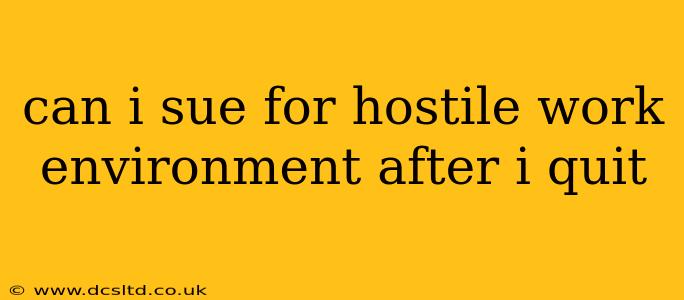Can I Sue for Hostile Work Environment After I Quit?
Yes, you may still be able to sue for a hostile work environment even after you've quit your job. However, the circumstances and timing of your departure are crucial factors that will affect your case. Quitting doesn't automatically disqualify you from pursuing legal action, but it does add a layer of complexity. Let's explore this further.
What Constitutes a Hostile Work Environment?
Before delving into the implications of quitting, it's essential to understand what defines a hostile work environment. It's a workplace where unwelcome harassment based on protected characteristics (race, religion, gender, sexual orientation, national origin, age, disability, etc.) is so severe or pervasive that it alters the conditions of employment and creates an abusive atmosphere. This doesn't just mean isolated incidents; it requires a pattern of behavior that makes the work environment unbearable. Examples include:
- Verbal harassment: Offensive jokes, slurs, threats, or constant belittling.
- Physical harassment: Unwanted touching, assault, or intimidation.
- Visual harassment: Offensive pictures, posters, or gestures.
- Cyberbullying: Harassment through emails, texts, or social media.
Why Quitting Doesn't Automatically Disqualify Your Claim
While quitting might seem like an admission that you couldn't tolerate the situation, it doesn't inherently bar you from filing a lawsuit. The crucial element is whether the hostile work environment was the reason you quit. If you can demonstrate a direct causal link between the harassment and your resignation—that you were essentially forced to leave due to the intolerable conditions—you have a stronger legal case.
How Quitting Can Affect Your Case
Your resignation's timing and how it's handled can significantly impact your case.
-
Constructive Discharge: If the hostile work environment was so severe that a reasonable person would have felt compelled to quit, the court might consider your resignation as a "constructive discharge." This means your resignation is treated as a termination by the employer, strengthening your claim.
-
Mitigation of Damages: The court might reduce the amount of damages awarded if it finds you didn't adequately try to mitigate the harm, like failing to report the harassment or seek internal resolution. However, if reporting mechanisms were ineffective or unsafe, this argument weakens.
-
Evidence: Documenting the harassment is vital. Keep records of every incident, including dates, times, witnesses, and any evidence like emails or messages. The more thorough your documentation, the stronger your case, even if you've already left the job.
What to Do After Quitting a Hostile Work Environment
-
Document Everything: Gather all evidence you can, including emails, texts, notes from meetings, and witness statements. This is crucial even after you've left.
-
Seek Legal Counsel: Consult with an employment lawyer as soon as possible. They can advise you on the strength of your case and the best course of action.
-
File a Charge with the Equal Employment Opportunity Commission (EEOC): This is usually a necessary step before filing a lawsuit in many jurisdictions.
-
Preserve Your Confidentiality: Avoid discussing the situation widely, especially on social media.
How Long Do I Have to File a Lawsuit?
Statutes of limitations vary by state and the type of claim. You generally have a limited time frame to file a lawsuit after the last incident of harassment or after you quit, whichever is later. It's imperative to consult with an attorney immediately to understand the relevant deadlines in your jurisdiction.
Can I sue my previous employer after I have found a new job?
Yes. Finding a new job does not preclude you from pursuing legal action for a hostile work environment experienced at your previous workplace. Your previous employer's actions are still subject to legal scrutiny, regardless of your current employment status.
In conclusion, while quitting complicates matters, it does not automatically bar you from pursuing a hostile work environment claim. The strength of your case depends heavily on the severity of the harassment, the reason for your resignation, and your ability to document and prove the connection between the two. Seek legal advice immediately to understand your rights and options.
